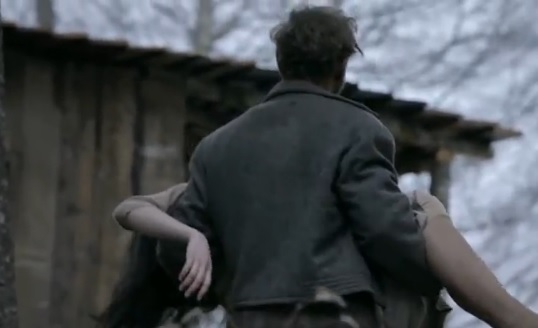Quickly answer this: Could you identify with a necrophiliac?
Aha! Because I’m psychic, I know that your first thoughts just went to Ted Bundy, didn’t they? Indeed, it’s hard to break away from the associations that icons – be they infamous or just famous – usher to the forefront of our minds. We know that Dahmer ate biceps because he was too lazy to go to the gym and make his own and that Teddy sexed deadsies. These are the first available abstract images we get when we think of egregious acts like porking corpses or storing bits of bodies in soup drums. And our brain says: “Bad! Scary! Not like us.” Alright, but why?
You might be surprised about how you feel after watching “Child of God” and seeing a homicidal woods-dwelling necrophiliac portrayed in a less black and white way. I sure was. Scott Haze plays Lester Ballard beautifully and we get to watch a world unfold fully and undefined – on screen.
And my mom had me beat after I’d read McCarthy’s story and before I’d seen Franco’s film. She picked up the book once I was done, thumbed through the first and last few pages, put it down after 10 seconds, and immediately gave a mindblow analysis of: “Oh, that’s sad. He was that way because they hit him on the head.” Her ability to nail-hit the character on the head – and so quickly – made my jaw drop like one of Ballard’s companion’s dismantled mandibles as it rotted away. And it also dropped when I finally saw Franco’s version of the film.
But it wasn’t the necro-sexy time that shocked me. In fact, it was so true stylistically to what I’d already read, that I felt I’d seen it before. But if memory serves me correctly, the Ballard of the book ends up captured and in a mental hospital next to a guy who ate brains or something. So even though I was rooting for the madman Haze portrays to escape, I was as surprised as when I watched Butterfly Effect “for the second time” (not realizing someone was playing the alternate ending version).

(Yes. I saw this twice. So shoot me. And fornicate with my remains.)
Unlike the introspective Kutcher character who eliminates himself when he realizes what a cancer he is to everyone around him, Ballard’s a man in survival mode. He’s damaged, but hanging on by a thread to that human connection craving – however warped it may be in its manifestation. So part of me’s like “this isn’t right!” when he gets away – and the follow up part’s like, “Yeah, it’s better than the book!” That’s because I wanted the protag to escape – but it’s technically inconsistent with the literature. Then, my brain’s follow-follow up thought was: is it though? Or does James just end the movie in the middle of one of Ballard’s law evasion excursions into the wilderness?
For all we know, he gets caught right after the credits roll.
I like that, though, because it causes a cascade of self-questioning, and one of the cars on that doubt train is: wait – why would I root for this villain in the first place? Is he a homicidal necrophile? Yes. But he only kills to acquire corpse friends because no one else’ll love him. In fact, it’s not until he finds an already-dead couple that he gets “experimental” on ‘em. And it’s not a split second decision, either. Ballard ventures to and fro the car holding the bodies several times before stealing the wallets and enjoying a bit of rigor mortis coitus. The further on the fringes he lived, the more this mentality amplified.
He had no one but a brewing madness exacerbated by social exclusion.
And some toy tigers.

So what started as a unibomber’s version of holding tea parties with stuffed animals he’d won at the fair, slowly progressed into a full blown deaddiction (does that work as a portmanteau? Dead? Addiction? Moving on…) Franco’s devices are super smart too – he showcases Ballard’s true disconnect by having him “murder” the stuffed animals after a fake betrayal they committed against him. As I’m watching that scene executing them while cry-whispering, “You ain’t my friend!”, I thought two things: one was how you have to shoot things the same way at the fair in order to get the animals in the first place – and now he’s ironically doing the same thing to get rid of them. That irony mirrors how the same people who made him the way he is just wanna get rid of him now.
And the second thing was how that first fact spurred his madness to a place where he’s now graduated to the next level of anthropomorphizing things to his liking. He’s found something closer to humanity without all the judgment that comes with it. So the toys get the pink slip after he buys his new lifeless girlfriend a red one. It’s really just a twisty version of when your honeymoon relache phase is over and a shiny new whoever shows up. Emotional execution’s in order. Ballard’s are just… ya know. A bit diff.

(Hey, in a way, this almost makes him the most empathic sociopathic murderer there is. “I’m doing all the work in this relationship…” Also, is it bad that I heard the same inspirational Band of Horses song from 127 hours in my head as he struggled to rise to his feet, clutching her dead weight?)
And if that’s doesn’t sell you on paper, let’s not forget (as my mom pointed out) how he was head-decked with a blunt object back when they nicked his property off him at an auction. When turned into a judgment-less character study like this, it’s easier to see the most fitting description of the protagonist is the title itself – a child of god like you or me. He’s lonely but stuck with a defect that makes him unable to connect like other people. So he generates dramas with the non-sentient but human-like objects of the world to compensate for that. Ballard’ just got less balance on that fine-line bordering the abyss perimeter within us that we all like to pretend doesn’t exist.
And as the Joker says…
“Madness, as you know, is a lot like gravity. All it takes is a little push…”
(My sketch of Haze’s Ballard. I had to post because the actor liked it on Instagram and my inflated sense of self importance wouldn’t let me get away without sharing that fact with you all.)